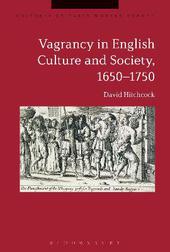
|
Vagrancy in English Culture and Society, 1650-1750
Paperback / softback
Main Details
| Title |
Vagrancy in English Culture and Society, 1650-1750
|
| Authors and Contributors |
By (author) Dr David Hitchcock
|
|
Series edited by Beat Kumin
|
|
Series edited by Professor Brian Cowan
|
| Series | Cultures of Early Modern Europe |
|---|
| Physical Properties |
| Format:Paperback / softback | | Pages:248 |
|
| Category/Genre | British and Irish History |
|---|
| ISBN/Barcode |
9781350058125
|
| Classifications | Dewey:942.06 |
|---|
| Audience | | Postgraduate, Research & Scholarly | | Undergraduate | |
|---|
| Illustrations |
10 bw illus
|
|
Publishing Details |
| Publisher |
Bloomsbury Publishing PLC
|
| Imprint |
Bloomsbury Academic
|
| Publication Date |
25 January 2018 |
| Publication Country |
United Kingdom
|
Description
CHOICE Outstanding Academic Title 2017 The first social and cultural history of vagrancy between 1650 and 1750, this book combines sources from across England and the Atlantic world to describe the shifting and desperate experiences of the very poorest and most marginalized of people in early modernity; the outcasts, the wandering destitute, the disabled veteran, the aged labourer, the solitary pregnant woman on the road and those referred to as vagabonds and beggars are all explored in this comprehensive account of the subject. Using a rich array of archival and literary sources, Vagrancy in English Culture and Society, 1650-1750 offers a history not only of the experiences of vagrants themselves, but also of how the settled 'better sort' perceived vagrancy, how it was culturally represented in both popular and elite literature as a shadowy underworld of dissembling rogues, gypsies, and pedlars, and how these representations powerfully affected the lives of vagrants themselves. Hitchcock's is an important study for all scholars and students interested in the social and cultural history of early modern England.
Author Biography
David Hitchcock is Lecturer in History at Canterbury Christ Church University, UK.
ReviewsHitchcock (Canterbury Christ Church Univ., UK) provides the first substantial investigation of vagrancy in English culture and society from 1650 to 1750, building on the groundbreaking scholarship of A.L. Beier, who examined rootlessness in England during the century previous (Masterless Men: The Vagrancy Problem in England 1560-1640, 1985). Hitchcock is to be commended for giving vivid voice to the most marginal and historically ephemeral of human populations. His work offers a highly readable and marvelously constructed social and cultural analysis of vagrancy grounded on a rich source base of royal proclamations, newspapers, pamphlets, court records, constabulary accounts, and popular ballads. The first half of the monograph explores the cultural construction of the vagrant, while the second gives a social history of vagrancy and subsistence mobility. Along the way, Hitchcock challenges a number of historiographic assumptions, namely, that contemporaries made clear-cut distinctions between vagrants and poor migrants; that English vagrancy declined in the decades following 1662; and that men constituted the vast body of vagrants in early modern England. This well-organized, highly accessible account will be of interest to all students of early modern culture, society, and gender. Summing Up: Highly recommended. All levels/libraries. * CHOICE * Hitchcock offers a distinctive take on early modern vagrancy, downplaying the emphasis in much existing historiography on demography and highlighting the need to consider both local social dynamics and the importance of printed discourse in more depth. * Journal of British Studies * This study makes a striking contribution to early modern social history. * The Seventeenth Century * Focusing on the century after the civil wars, David Hitchcock's book fills a significant gap in the literature, exploring the relationship between legal and literary representations of the vagrant and the social reality revealed in judicial records and constables' accounts. Vagrancy remained a significant issue, with a prominent gender dimension, yet Hitchcock emphasises how fluid was the boundary that separated the 'vagrant' from the legitimate 'poor traveller'. Combining quantitative evidence with poignant human stories, and vigorously argued, his book marks a significance advance in the field. * Bernard Capp, Emeritus Professor of History, University of Warwick, UK * This book opens up new territory in the history of vagrancy. It is based upon a firm grasp of literary and archival source materials in England and North America. The upshot is an informed, thorough and thoughtful re-examination. In particular, the author argues for a re-thinking of the chronology of the problem, because previous authorities thought the period saw a diminution in its gravity. The author is a product of the "Warwick" school of social history, which emphasizes the cultural contexts of its subjects. It is a highly readable text and a fine example of the Warwick school. * A. L. Beier, Illinois State University, USA * This is an easily readable, thoroughly stimulating study. * Zeitschrift fur Historische Forschung (Bloomsbury Translation) *
|